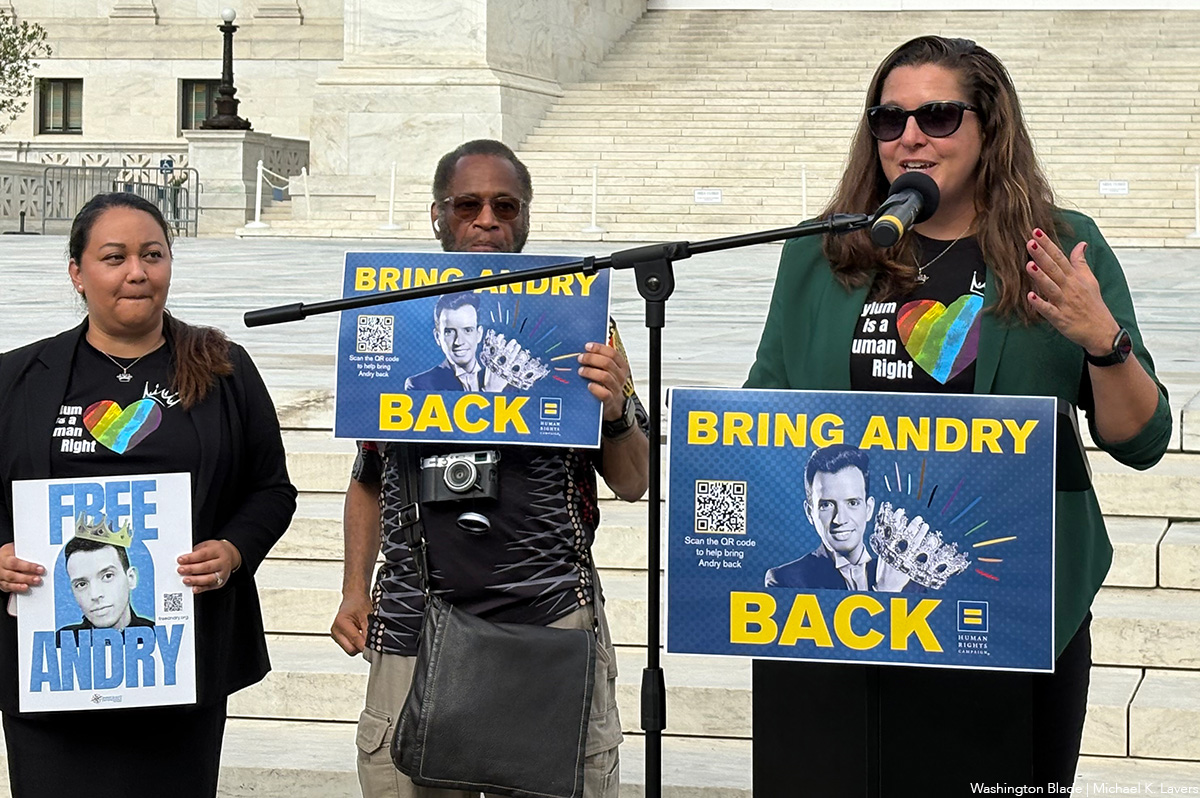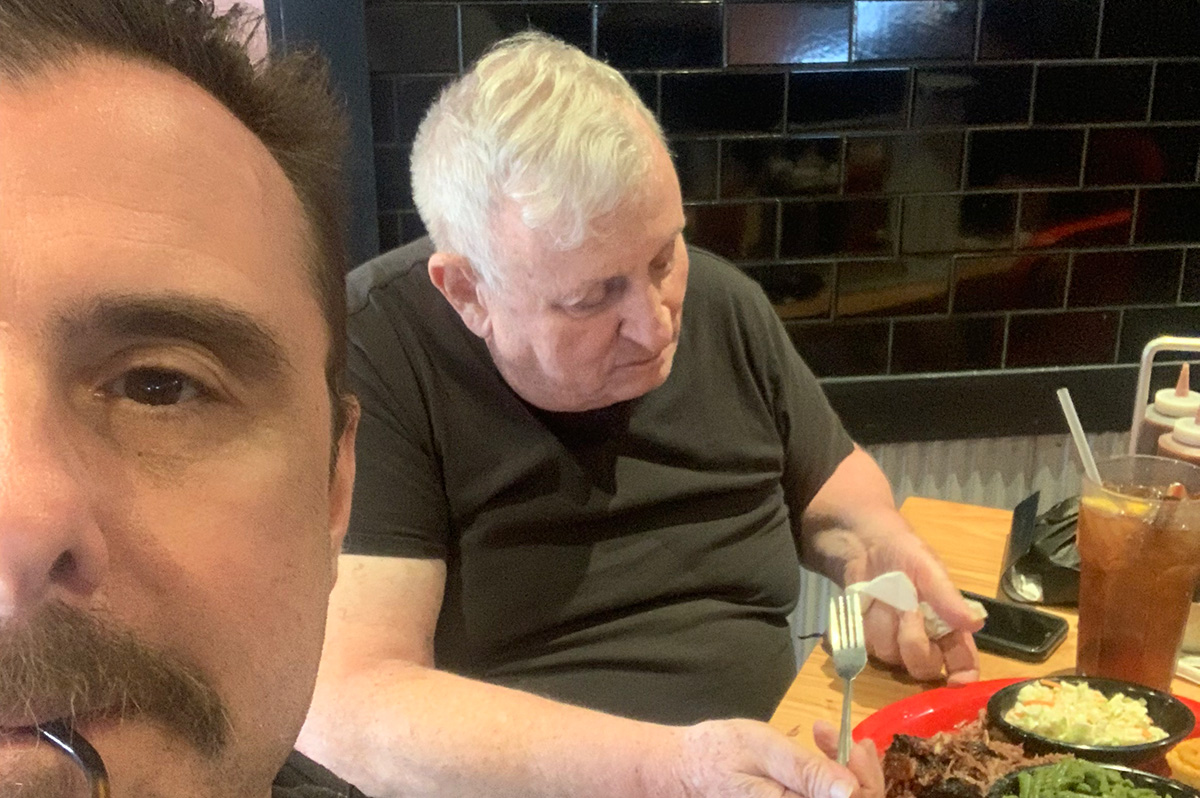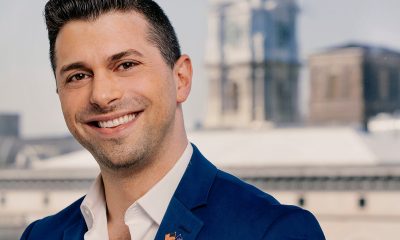National
Advocates seek Obama order barring LGBT job bias
Directive could be alternative to ENDA

An executive order to prohibit workplace discrimination against LGBT people is receiving renewed attention now that the makeup of Congress makes passage of the Employment Non-Discrimination Act highly unlikely for at least two years.
LGBT rights supporters are pressing President Obama to issue a directive requiring the federal government to contract only with companies that have non-discrimination policies based on sexual orientation and gender identity protecting their employees.
Richard Socarides, president of Equality Matters, said an executive order for LGBT workplace protections “ought to be something the president seriously considers doing.”
“It’s definitely an administrative device the president can use to help advance the cause of full equality, especially if the Congress is unwilling to take action,” Socarides said.
Even though some companies don’t contract with the federal government, Socarides said the directive would set an example for all U.S. businesses to comply with the new rules.
“Most people are going to want to do that — whether or not they contract with the government,” he said.
Fred Sainz, the Human Rights Campaign’s vice president of communications, noted his organization has been calling on Obama to make the change since the beginning of the administration as part of a broad portfolio of proposals.
“The recommendation to issue an executive order is part of HRC’s ‘Blueprint for Positive Change,’ which includes the various policy changes that we have asked of the federal government,” Sainz said.
As it was introduced in the 111th Congress, ENDA would bar job discrimination based on sexual orientation and gender identity in most situations in the public and private workforce.
An executive order on LGBT workplace discrimination could be a workable alternative now that Republicans have taken control of the House and cut into the Democratic majority in the Senate after the 2010 midterm elections, making passage of ENDA in Congress significantly more challenging, if not impossible.
Whether Obama would be willing to issue such an executive order remains to be seen. The president has called for passage of ENDA, but hasn’t voiced an opinion about an administrative action instituting workplace protections for LGBT people.
“The president continues to examine steps the federal government can take to help secure equal rights for LGBT Americans,” said White House spokesperson Shin Inouye. “While I can’t speak to this specific proposal, we’ve already taken steps such as extending benefits to the same-sex domestic partners of federal employees and ensuring equal access to HUD programs, and we hope to continue making progress.”
Nan Hunter, a lesbian law professor at Georgetown University, said a directive protecting LGBT people would be a “terrific idea” because history has shown executive orders for non-discrimination often precede changes in law.
“I think the pertinent piece in terms of the civil rights history is that the federal contractor requirements were put in place prior to the enactment of the statutes,” Hunter said.
In 1964, President Johnson issued an executive order prohibiting most federal contractors from discriminating on the basis of race, color, religion, sex or national origin — prior to the enactment of Title VII of the Civil Rights Act, which provides similar protections in statute. Johnson’s directive could be used as a model for a directive protecting LGBT people.
Hunter said she sees no legal impediment to Obama issuing a workplace non-discrimination order for LGBT people and noted the federal government has “long had the custom” of instituting requirements for contractors that the majority of businesses don’t satisfy.
“That kind of executive order exists with regard to race, sex, religion, other protected characteristics — there is no reason why it could not be issued with regard to sexual orientation and gender identity,” she said.
Still, Hunter acknowledged that Obama may face political challenges in issuing such an order — much like the difficulties Congress had in passing ENDA — if the directive includes protections for transgender people.
“I think that’s the political concern at both ends of Pennsylvania Avenue,” she said. “On the other hand, I think that it would be unfortunate — or it would be wrong, really — to have an executive order that covered only sexual orientation and not gender identity.”
An executive order prohibiting the federal government from doing business with companies that don’t have non-discrimination policies protecting LGBT people would have less reach than ENDA.
According to the Williams Institute, the federal government contracts with 91,367 companies. The percent of the U.S. workforce that these companies employ is unknown. However, the executive order that Johnson issued in 1964, which covered most federal contractors, protected only an estimated 22 percent of the civilian workforce.
Sainz disputed the notion that an administrative action for workplace protections could take the place of legislatively passing ENDA.
“It is not an ENDA,” Sainz said. “It would only apply to companies that have contracts with the federal government. We believe it to be an incredibly important step forward but would not replace a fully inclusive ENDA that would apply to all workplaces, whether they be a federal contractor or not.”
Socarides acknowledged legislation would be the preferred route to provide workplace protections to LGBT people, but said an executive order would have some reach in lieu of an act of Congress.
“It sometimes comes after congressional hearings and often, after legislative action, there’s some sense that there’s been some national consensus around it,” he said. “But absent the willingness of Congress to move on it, I don’t think it would be as effective, but it could get a lot of the job done.”
U.S. Federal Courts
Judge temporarily blocks executive orders targeting LGBTQ, HIV groups
Lambda Legal filed the lawsuit in federal court

A federal judge on Monday blocked the enforcement of three of President Donald Trump’s executive orders that would have threatened to defund nonprofit organizations providing health care and services for LGBTQ people and those living with HIV.
The preliminary injunction was awarded by Judge Jon Tigar of the U.S. District Court for the Northern District of California in a case, San Francisco AIDS Foundation v. Trump, filed by Lambda Legal and eight other organizations.
Implementation of the executive orders — two aimed at diversity, equity, and inclusion along with one targeting the transgender community — will be halted pending the outcome of the litigation challenging them.
“This is a critical win — not only for the nine organizations we represent, but for LGBTQ communities and people living with HIV across the country,” said Jose Abrigo, Lambda Legal’s HIV Project director and senior counsel on the case.
“The court blocked anti-equity and anti-LGBTQ executive orders that seek to erase transgender people from public life, dismantle DEI efforts, and silence nonprofits delivering life-saving services,” Abrigo said. “Today’s ruling acknowledges the immense harm these policies inflict on these organizations and the people they serve and stops Trump’s orders in their tracks.”
Tigar wrote, in his 52-page decision, “While the Executive requires some degree of freedom to implement its political agenda, it is still bound by the constitution.”
“And even in the context of federal subsidies, it cannot weaponize Congressionally appropriated funds to single out protected communities for disfavored treatment or suppress ideas that it does not like or has deemed dangerous,” he said.
Without the preliminary injunction, the judge wrote, “Plaintiffs face the imminent loss of federal funding critical to their ability to provide lifesaving healthcare and support services to marginalized LGBTQ populations,” a loss that “not only threatens the survival of critical programs but also forces plaintiffs to choose between their constitutional rights and their continued existence.”
The organizations in the lawsuit are located in California (San Francisco AIDS Foundation, Los Angeles LGBT Center, GLBT Historical Society, and San Francisco Community Health Center), Arizona (Prisma Community Care), New York (The NYC LGBT Community Center), Pennsylvania (Bradbury-Sullivan Community Center), Maryland (Baltimore Safe Haven), and Wisconsin (FORGE).
U.S. Supreme Court
Activists rally for Andry Hernández Romero in front of Supreme Court
Gay asylum seeker ‘forcibly deported’ to El Salvador, described as political prisoner

More than 200 people gathered in front of the U.S. Supreme Court on Friday and demanded the Trump-Vance administration return to the U.S. a gay Venezuelan asylum seeker who it “forcibly disappeared” to El Salvador.
Lindsay Toczylowski, president of the Immigrant Defenders Law Center, a Los Angeles-based organization that represents Andry Hernández Romero, is among those who spoke alongside U.S. Rep. Mark Takano (D-Calif.) and Human Rights Campaign Campaigns and Communications Vice President Jonathan Lovitz. Sarah Longwell of the Bulwark, Pod Save America’s Jon Lovett, and Tim Miller are among those who also participated in the rally.
“Andry is a son, a brother. He’s an actor, a makeup artist,” said Toczylowski. “He is a gay man who fled Venezuela because it was not safe for him to live there as his authentic self.”
(Video by Michael K. Lavers)
The White House on Feb. 20 designated Tren de Aragua, a Venezuelan gang, as an “international terrorist organization.”
President Donald Trump on March 15 invoked the Alien Enemies Act of 1798, which the Associated Press notes allows the U.S. to deport “noncitizens without any legal recourse.” The Trump-Vance administration subsequently “forcibly removed” Hernández and hundreds of other Venezuelans to El Salvador.
Toczylowski said she believes Hernández remains at El Salvador’s Terrorism Confinement Center, a maximum-security prison known by the Spanish acronym CECOT. Toczylowski also disputed claims that Hernández is a Tren de Aragua member.
“Andry fled persecution in Venezuela and came to the U.S. to seek protection. He has no criminal history. He is not a member of the Tren de Aragua gang. Yet because of his crown tattoos, we believe at this moment that he sits in a torture prison, a gulag, in El Salvador,” said Toczylowski. “I say we believe because we have not had any proof of life for him since the day he was put on a U.S. government-funded plane and forcibly disappeared to El Salvador.”
“Andry is not alone,” she added.
Takano noted the federal government sent his parents, grandparents, and other Japanese Americans to internment camps during World War II under the Alien Enemies Act. The gay California Democrat also described Hernández as “a political prisoner, denied basic rights under a law that should have stayed in the past.”
“He is not a case number,” said Takano. “He is a person.”
Hernández had been pursuing his asylum case while at the Otay Mesa Detention Center in San Diego.
A hearing had been scheduled to take place on May 30, but an immigration judge the day before dismissed his case. Immigrant Defenders Law Center has said it will appeal the decision to the Board of Immigration Appeals, which the Justice Department oversees.
“We will not stop fighting for Andry, and I know neither will you,” said Toczylowski.
Friday’s rally took place hours after Attorney General Pam Bondi said Kilmar Abrego Garcia, a Maryland man who the Trump-Vance administration wrongfully deported to El Salvador, had returned to the U.S. Abrego will face federal human trafficking charges in Tennessee.
National
A husband’s story: Michael Carroll reflects on life with Edmund White
Iconic author died this week; ‘no sunnier human in the world’

Unlike most gay men of my generation, I’ve only been to Fire Island twice. Even so, the memory of my first visit has never left me. The scenery was lovely, and the boys were sublime — but what stood out wasn’t the beach or the parties. It was a quiet afternoon spent sipping gin and tonics in a mid-century modern cottage tucked away from the sand and sun.
Despite Fire Island’s reputation for hedonism, our meeting was more accident than escapade. Michael Carroll — a Facebook friend I’d chatted with but never met — mentioned that he and his husband, Ed, would be there that weekend, too. We agreed to meet for a drink. On a whim, I checked his profile and froze. Ed was author Edmund White.
I packed a signed copy of Carroll’s “Little Reef” and a dog-eared hardback of “A Boy’s Own Story,” its spine nearly broken from rereads. I was excited to meet both men and talk about writing, even briefly.
Yesterday, I woke to the news that Ed had passed away. Ironically, my first thought was of Michael.
This week, tributes to Edmund White are everywhere — rightly celebrating his towering legacy as a novelist, essayist, and cultural icon. I’ve read all of his books, and I could never do justice to the scope of a career that defined and chronicled queer life for more than half a century. I’ll leave that to better-prepared journalists.
But in those many memorials, I’ve noticed something missing. When Michael Carroll is mentioned, it’s usually just a passing reference: “White’s partner of thirty years, twenty-five years his junior.” And yet, in the brief time I spent with this couple on Fire Island, it was clear to me that Michael was more than a footnote — he was Ed’s anchor, editor, companion, and champion. He was the one who knew his husband best.
They met in 1995 after Michael wrote Ed a fan letter to tell him he was coming to Paris. “He’d lost the great love of his life a year before,” Michael told me. “In one way, I filled a space. Understand, I worshiped this man and still do.”
When I asked whether there was a version of Ed only he knew, Michael answered without hesitation: “No sunnier human in the world, obvious to us and to people who’ve only just or never met him. No dark side. Psychology had helped erase that, I think, or buffed it smooth.”
Despite the age difference and divergent career arcs, their relationship was intellectually and emotionally symbiotic. “He made me want to be elegant and brainy; I didn’t quite reach that, so it led me to a slightly pastel minimalism,” Michael said. “He made me question my received ideas. He set me free to have sex with whoever I wanted. He vouchsafed my moods when they didn’t wobble off axis. Ultimately, I encouraged him to write more minimalistically, keep up the emotional complexity, and sleep with anyone he wanted to — partly because I wanted to do that too.”
Fully open, it was a committed relationship that defied conventional categories. Ed once described it as “probably like an 18th-century marriage in France.” Michael elaborated: “It means marriage with strong emotion — or at least a tolerance for one another — but no sex; sex with others. I think.”
That freedom, though, was always anchored in deep devotion and care — and a mutual understanding that went far beyond art, philosophy, or sex. “He believed in freedom and desire,” Michael said, “and the two’s relationship.”
When I asked what all the essays and articles hadn’t yet captured, Michael paused. “Maybe that his writing was tightly knotted, but that his true personality was vulnerable, and that he had the defense mechanisms of cheer and optimism to conceal that vulnerability. But it was in his eyes.”
The moment that captured who Ed was to him came at the end. “When he was dying, his second-to-last sentence (garbled then repeated) was, ‘Don’t forget to pay Merci,’ the cleaning lady coming the next day. We had had a rough day, and I was popping off like a coach or dad about getting angry at his weakness and pushing through it. He took it almost like a pack mule.”
Edmund White’s work shaped generations — it gave us language for desire, shame, wit, and liberation. But what lingers just as powerfully is the extraordinary life Ed lived with a man who saw him not only as a literary giant but as a real person: sunny, complex, vulnerable, generous.
In the end, Ed’s final words to his husband weren’t about his books or his legacy. They were about care, decency, and love. “You’re good,” he told Michael—a benediction, a farewell, maybe even a thank-you.
And now, as the world celebrates the prolific writer and cultural icon Edmund White, it feels just as important to remember the man and the person who knew him best. Not just the story but the characters who stayed to see it through to the end.
-

 World Pride 20253 days ago
World Pride 20253 days agoWorldPride recap: Festival, parade, fireworks, and Doechii
-

 U.S. Federal Courts3 days ago
U.S. Federal Courts3 days agoJudge temporarily blocks executive orders targeting LGBTQ, HIV groups
-

 Photos3 days ago
Photos3 days agoPHOTOS: WorldPride Parade
-

 Photos3 days ago
Photos3 days agoPHOTOS: WorldPride Street Festival and Closing Concert













